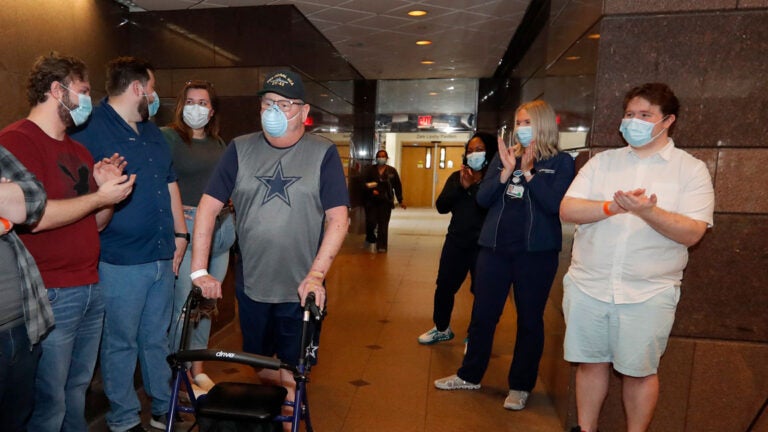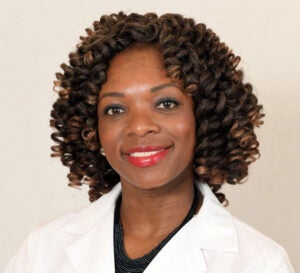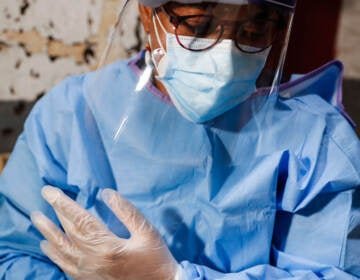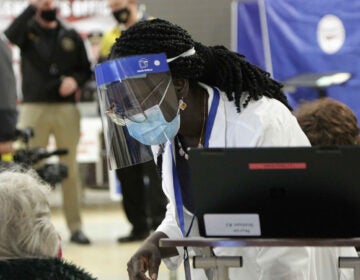‘A whole-body rehab process’: COVID battle doesn’t end at the hospital door
Recovery can last months with many needing rehab and facing long-term damage.

COVID-19 patient Stephen Donelson is applauded by family and health care professionals as he departs the Zale Hospital in Dallas. During his three-month hospital stay, Donelson spent 17 days on a ventilator. When it was removed, he was too weak to sit without support and the breathing tube had taken away his ability to swallow. (AP Photo/Tony Gutierrez)
This story originally appeared on NJ Spotlight.
___
Hospital “clap-out” ceremonies are filled with of hope, as doctors, nurses and other caregivers line the hallways to cheer for a coronavirus patient heading home, into the loving arms of family and friends.
But these joyous events are not the end of the struggle for many COVID-19 patients in New Jersey and elsewhere, experts have learned.
The illness can cause short- and long-term damage to multiple organs — including the heart, lungs and kidneys. Even people who were not hospitalized can struggle for weeks or months to regain their physical strength and mental acuity, health care providers report. The ordeal can also leave patients with anxiety, depression and other mental health issues.
“At the clap-out, everyone’s happy in that stage because another person survived. But the part you don’t get to see is what happens when they go home,” explained Dr. Talya Fleming, medical director of the after care and stroke programs at JFK Johnson Rehabilitation Institute in Edison, which recently opened an outpatient program focused on long-term coronavirus recovery. “There’s a whole other layer to the story after that.”
University Hospital in Newark has also launched a long-term COVID-19 recovery program, with specialists to meet a wide range of patient needs. “People in our community were hit hard with COVID-19, and unfortunately, our frontline clinicians are seeing that it can have health effects that last well beyond recovery from acute illness,” said Dr. Shereef Elnahal, University’s president and CEO and the former New Jersey health commissioner.
A struggle to manage basic activities
The recovery program at JFK, which is part of the Hackensack Meridian Health system, involves a range of specialists, therapists and other health professionals. Fleming said many patients — including some who were not even hospitalized — are surprised to find they may struggle with basic activities for so long; her patients describe relatively modest goals, like being able to walk from one room to another on their own, or tie a shoe without losing their breath.

“People need to know they don’t have to suffer in silence. There is a place they can go to get help,” she said.
Physical therapist Melisa DelaCruz, the chief operating officer at Trinity Rehab, with offices throughout New Jersey, said coronavirus patients who experienced long hospitalizations often need to strengthen muscles and relearn seemingly innate techniques in order to sit up straight, balance on two legs, or breathe effectively on their own. Even those who weren’t sick enough to be hospitalized may have lost basic function during the illness, she said, recalling a mother who struggled to pick up her toddler long after she was diagnosed.
“The physical ramifications of COVID are huge,” DelaCruz said. “A lot of people think it’s just pulmonary (or impacting the heart and lungs), but it goes way beyond that,” she said. “It actually becomes a whole-body rehab process.”
More than 190,000 New Jersey residents have been diagnosed with COVID-19 since March, and as many as 16,000 have likely died as a result, state figures show. At the peak, in mid-April, more than 8,000 patients were hospitalized, with 2,000 of them in critical care units and most of them connected to a ventilator. Between April 15 and August 20, nearly 19,300 patients were discharged from the hospital, according to the state Department of Health.
Unable to go straight home from hospital
While the DOH does not systematically track where patients go after discharge from acute care hospitals, experts agree many did not go straight home. Patients who were medically stable but still needed a ventilator to help them breathe likely went to one of New Jersey’s 10 long-term acute care hospitals (LTACHs), which provide ongoing medical care and work to wean individuals from artificial ventilation.
“There were literally hundreds of referrals to our 10 LTACHs,” said Theresa Edelstein, a senior vice president with the New Jersey Hospital Association.
Long-term hospitals are designed for patients likely to be there up to a month, Edelstein said. From there, individuals may go to one of the state’s 370-plus skilled nursing facilities for several weeks or months; these nursing homes also admit patients directly from the hospital if they can breathe on their own and are medically stable. These sites also have units that provide care to frail and elderly residents, a system that has come under fire in the pandemic.
New Jersey also has 20 rehabilitation hospitals, Edelstein said, which are designed for individuals strong enough to tolerate a certain amount of physical therapy, but unable to live independently. Rehab hospitals focus on building a patient’s strength and helping them regain independence by teaching people techniques to get themselves in and out of a wheelchair, for example, or safely use the bathroom on their own.
“Others are strong enough to go home (from the hospital), but the rehab process is definitely continuing,” Edelstein said. This could involve assistance from home care professionals, outpatient physical therapy, and other services.
Experts said there is limited data to show what percentage of patients, or which ones, are more likely to suffer prolonged symptoms because of COVID-19. While individuals with underlying conditions — like diabetes and heart and lung conditions — are more susceptible to the coronavirus, doctors have also seen plenty of healthy patients fall ill. (Communities of color are also more vulnerable to infection for a host of medical, social and economic reasons.)
No predictability
“It’s not predictable how (a patient’s) disease course will pan out,” said Dr. Pinki Bhatt, an assistant professor of infectious diseases at Rutgers Robert Wood Johnson Medical School and physician at Robert Wood Johnson Hospital in New Brunswick. Youth does not offer any real immunity, she added, something Gov. Phil Murphy has tried to impress upon the public in the wake of gatherings that led to outbreaks among young people.
“I have seen young, healthy patients progress fairly quickly,” Bhatt said. “I don’t think this disease affects just one age group or population. It affects all ages, whether they are healthy or not.”

COVID-19 symptoms range from a mild fever to respiratory failure, Bhatt said, with some patients able to recover at home while others require weeks or more in critical care. Doctors are finding the disease can lead to stroke, skin damage, kidney failure and more. Some of the damage is likely caused not by the virus itself but by an overblown immune response, known as a cytokine storm, which is seen in a growing number of patients, she said. “And then of course there are the long-term psychological and lung issues,” Bhatt added.
Edelstein, with the hospital association, is also concerned about the mental health challenges of recovery from the disease, a situation that is exacerbated by the nature of the pandemic itself. “People are trying to recover in relative isolation,” she said, without the usual support system of family and friends or the distraction of outside activities. Community-based mental health providers are working to assist these individuals, she said, “but this has definitely put a stress on our mental health capacity.”
Perhaps most common are breathing problems, doctors and other clinicians said, which may require oxygen support, physical therapy and other treatment. Experts have also seen COVID-19 patients who need regular dialysis to relieve damaged kidneys, while others require medication to resolve blood-clotting abnormalities. Encephalitis, or swelling of the brain, has been observed, as well as a decrease in taste or smell, and hair loss. Fleming, with the JFK Johnson Rehabilitation Institute, said some recovered patients complained about mental fogginess and fatigue that lasted for weeks.
Limited data is emerging of COVID-19’s impact on the heart, which indicates a potential for short- and long-term coronary complications. A study of 100 patients at a hospital in Frankfurt, Germany — two-thirds of whom were not hospitalized — showed nearly eight out of 10 had some form of heart abnormality more than two months after being diagnosed with the virus.
With this and other research, “we see the plot thickening and we are inclined to raise a new and very evident concern that cardiomyopathy and heart failure related to COVID-19 may potentially evolve as the natural history of this infection becomes clearer,” the study’s authors wrote in JAMA Network in late July.
WHYY is your source for fact-based, in-depth journalism and information. As a nonprofit organization, we rely on financial support from readers like you. Please give today.



![CoronavirusPandemic_1024x512[1]](https://whyy.org/wp-content/uploads/2020/03/CoronavirusPandemic_1024x5121-300x150.jpg)


